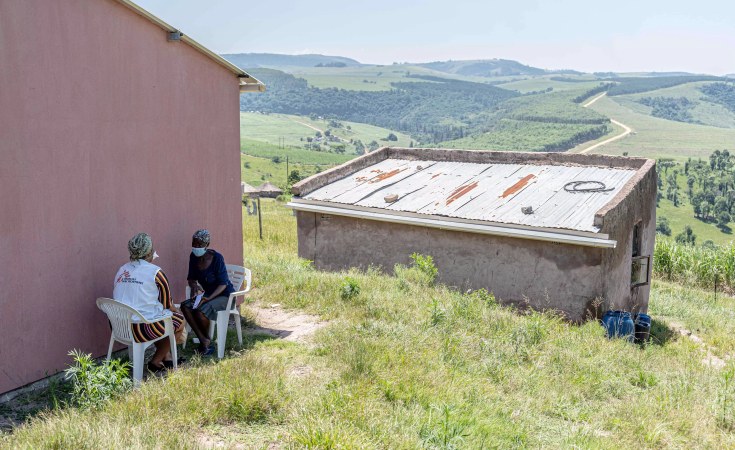South Africa's ongoing efforts to respond to Tuberculosis (TB) have been strengthened with funding of $94 million for the next five years.
"Just over R4 billion was budgeted in the 2024/2025 [financial year], meeting the projected needs for implementing the National Strategic Plan (NSP). Seventy-one percent of the TB budget is from domestic sources, 21% from Global Fund and 8% from United States government commitments," Minister of Health, Dr Joe Phaahla said on Sunday in Sedibeng.
The Minister was addressing South Africa's commemorations for World TB Day, which is being observed under the theme: "Yes! You and I Can End TB".
"We applaud the announcement by National Department of Health and United States Agency for International Development (USAID) of the award of the Accelerate Tuberculosis Elimination and Program Resilience Activity (referred to as ACCELERATE) in the amount of $94 million for the next five years.
"As government, we welcome the generous support from Global Fund and the United States government and appreciate their continued support towards HIV, TB and sexually transmitted diseases (STDs) response," Phaahla said.
In addition, the TB Programme of the National Department of Health has developed a comprehensive TB Recovery Plan dashboard, which is used by provinces and districts to monitor the progress of the TB programme.
The department has also developed an HIV and TB dashboard in the Health Information Centre.
"The South African National AIDS Council (SANAC) Situation Room is a state-of the-art data consolidation and visualisation hub built at the SANAC offices in Pretoria but can be accessed virtually from anywhere in the world.
"There is an enormous quantity of data that is generated in many parts and entities of South Africa. It exists in silos and that fragmentation is due to the lack of a central data repository and management point.
"This has made monitoring and evaluation of the country's efforts against HIV, TB and STIs rather difficult. These new data visualisation dashboards have been set up precisely to address that challenge," the Minister said.
Progress in fight against TB
Although South Africa remains among the TB high burden countries, there has been notable progress in the country's fight against the disease.
"A steady decline has been noted in the number of people diagnosed with TB each year since 2007 where the figure was 644 000 compared to 280 000 in 2022. TB-related deaths are falling, but at a much slower rate," the Minister said.
At last year's commemoration South Africa launched the NSP for HIV, TB and STIs for the period 2023 to 2028 with ambitious targets for TB and the other two epidemics.
"The National Department of Health has further developed a TB Strategic Plan, which lifts our very pertinent actions that must be taken to address the TB specific challenges as we go towards the end date. This TB strategic plan is fully aligned with our NSP for HIV, TB and STIs and it will inform the content of the annual TB Recovery Plans for the period 2023 to 2027.
"The successful implementation of the NSP relies on several critical enablers such as the proper implementation of the National TB Recovery Plan, which is one of the tools we have to mitigate against the impact of COVID-19 on the national TB programme.
"We must scale up the implementation, use, and rapid uptake of new tools and innovations - these include GeneXpert; shorter and oral regimens for drug-resistant TB, as well as routine testing of TB contacts and at-risk populations," the Minister said.
He said the collective counter-response to TB must focus on strengthening early case detection through targeted testing initiatives, particularly among vulnerable populations like men.
"There has been demonstrable will and desire by this government to use all innovations and technology to confront this challenge. As we all know, South Africa has been and remains the world leader in the introduction of new tools to test TB and to treat TB.
"The introduction of the new World Health Organization (WHO) approved Rapid Diagnostic tests for TB has been done as early as 2010. To date we are looking forward to targeted new generation sequencing.
"The introduction of new and repurposed TB drugs has helped significantly improve the proportion of cured drug resistant (DR-TB) patients. We have rolled out shorter regimens with better drugs for the treatment of drug resistant tuberculosis, with the notable launch of the bedaquiline-pretomanid-linezolid-levofloxacin (BPAL-L) programme in September 2023, that has almost 2,000 patients on a six-month DR-TB regimen," the Minister said.
South Africa has been part of a vaccine development programme, which is conducted by GlaxoSmithKline (GSK).
"This gives us hope that indeed, we will end TB, by working with all role players, opinion makers, scientists, academics, politicians, and general population," the Minister said.


